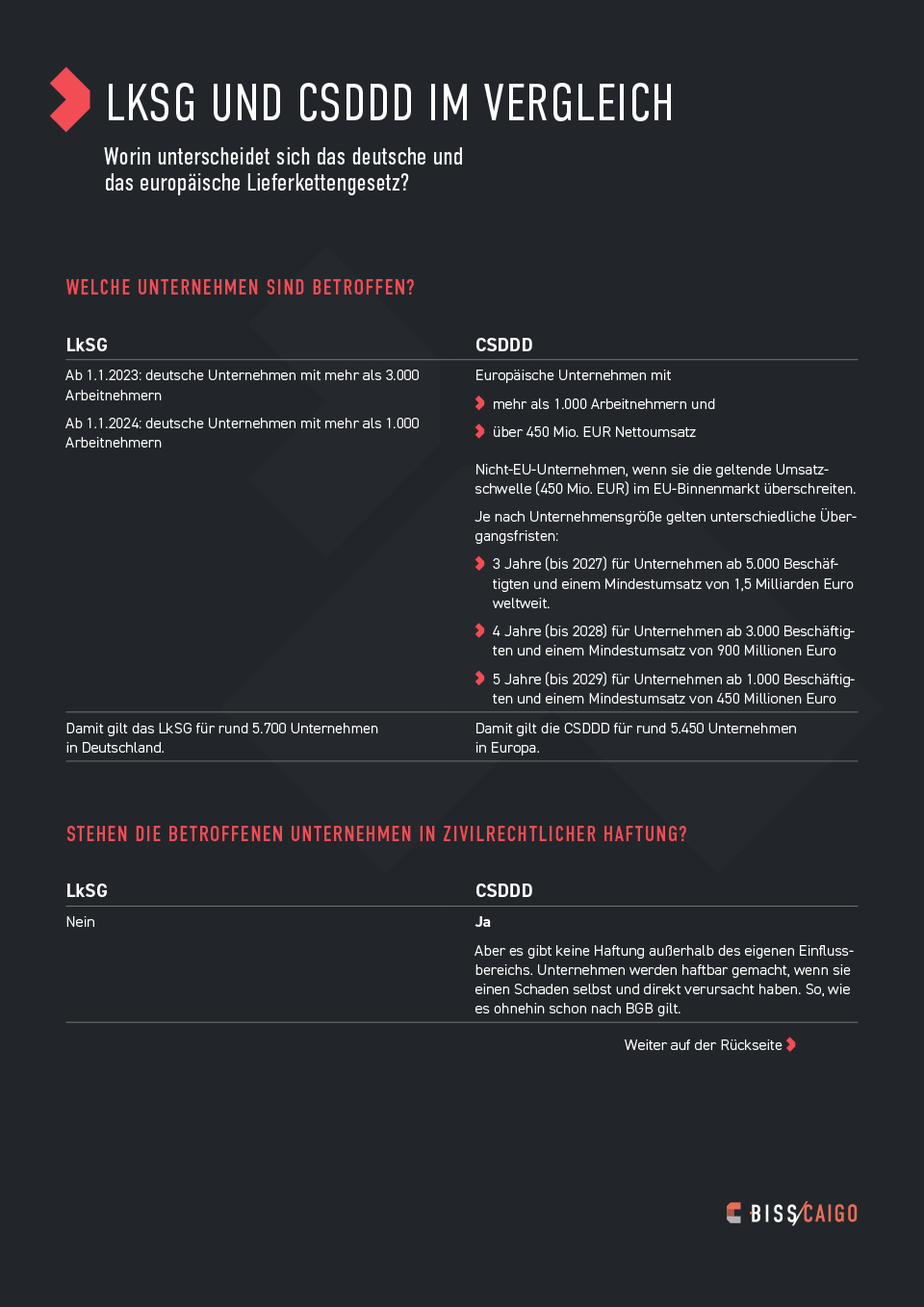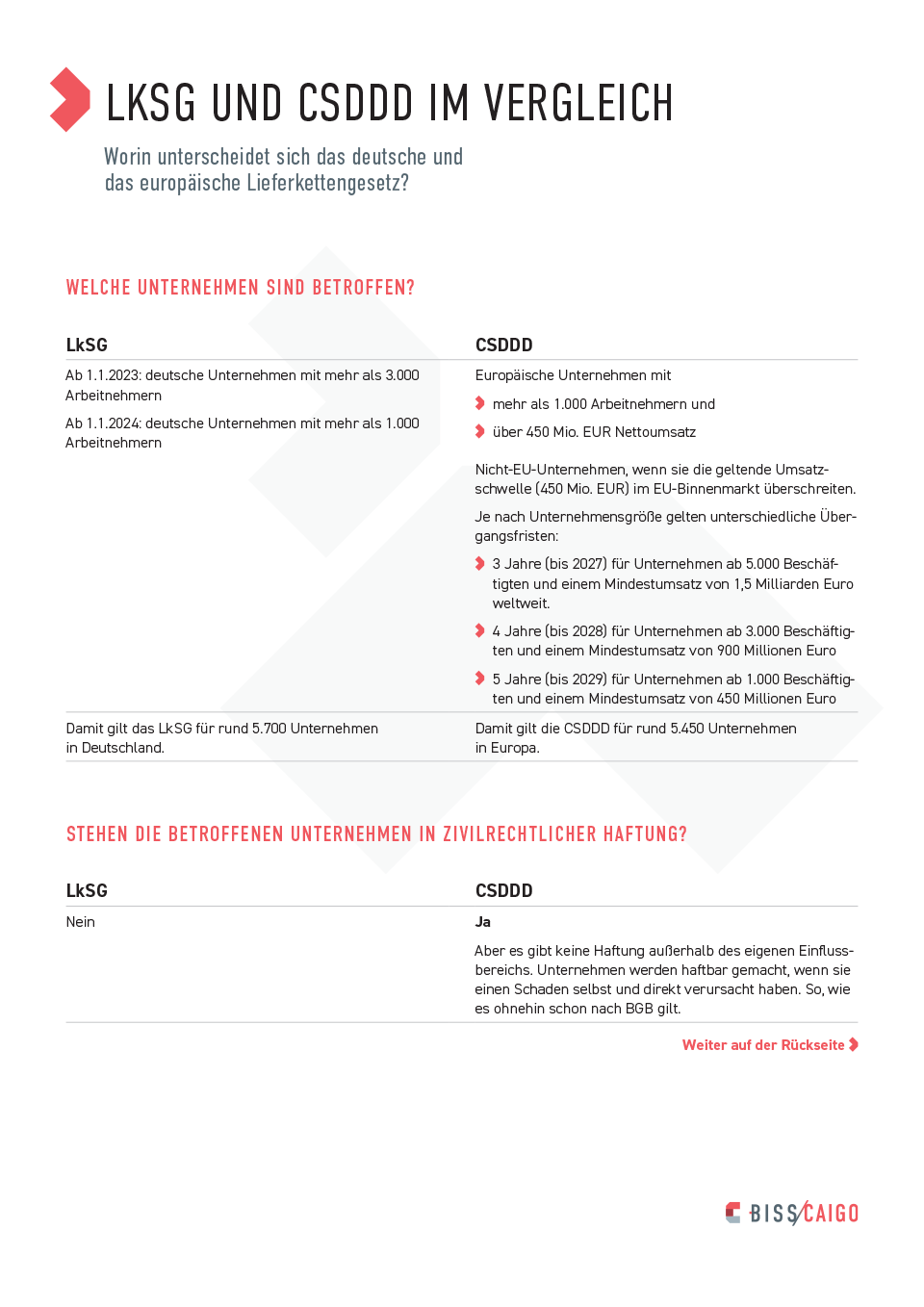LkSG and CSDDD in comparison

Which companies are affected?
LkSG
CSDDD
From 1 January 2023: German companies with more than 3,000 employees
From 1 January 2024: German companies with more than 1,000 employees
European companies with
- more than 1,000 employees and
- over EUR 450 million net sales
Non-EU companies if they exceed the applicable turnover threshold (EUR 450 million) in the EU internal market.
Different transition periods apply depending on the size of the company:
- 3 years (until 2027) for companies with 5,000 or more employees and a minimum turnover of 1.5 billion euros worldwide.
- 4 years (until 2028) for companies with 3,000 or more employees and a minimum turnover of 900 million euros
- 5 years (until 2029) for companies with 1,000 or more employees and a minimum turnover of 450 million euros
Are the companies concerned liable under civil law?
LkSG
CSDDD
Yes
But there is no liability outside your own sphere of influence. Companies are held liable if they have directly caused damage themselves. As is already the case under the German Civil Code.
What obligations do the companies concerned have?
LkSG
CSDDD
Comprehensive due diligence obligations for the environment and human rights along the supply chain.
Indirect suppliers and distribution chain including use and disposal of products.
Additional environmental concerns e.g.
- Protection of flora and fauna;
- Ban on substances that damage the ozone layer;
- Protection of cultural heritage;
- Minimising the impact on wetlands;
- Prevention of pollution caused by waste from ships;
-
climate target of limiting global warming to 1.5 degrees through CO2 savings.
What sanctions are threatened?
LkSG
CSDDD
Which companies are affected?
LkSG
From 1 January 2023: German companies with more than 3,000 employees
From 1 January 2024: German companies with more than 1,000 employees
CSDDD
European companies with
- more than 1,000 employees and
- over EUR 450 million net sales
Non-EU companies if they exceed the applicable turnover threshold (EUR 450 million) in the EU internal market.
Different transition periods apply depending on the size of the company:
- 3 years (until 2027) for companies with 5,000 or more employees and a minimum turnover of 1.5 billion euros worldwide.
- 4 years (until 2028) for companies with 3,000 or more employees and a minimum turnover of 900 million euros
- 5 years (until 2029) for companies with 1,000 or more employees and a minimum turnover of 450 million euros
Are the companies concerned liable under civil law?
LkSG
CSDDD
Yes
But there is no liability outside your own sphere of influence. Companies are held liable if they have directly caused damage themselves. As is already the case under the German Civil Code.
Welche Pflichten haben die betroffenen Unternehmen?
LkSG
CSDDD
Comprehensive due diligence obligations for the environment and human rights along the supply chain.
Indirect suppliers and distribution chain including use and disposal of products.
Additional environmental concerns e.g.
- Protection of flora and fauna;
- Ban on substances that damage the ozone layer;
- Protection of cultural heritage;
- Minimising the impact on wetlands;
- Prevention of pollution caused by waste from ships;
-
climate target of limiting global warming to 1.5 degrees through CO2 savings.




